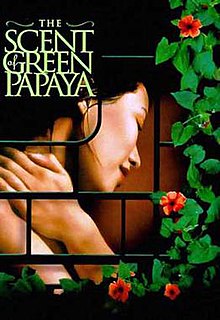In The Scent of Green Papaya, a courtyard garden serves as young servant Mui’s (Man San Lu and Tran Nu Yên-Khê) respite from a coming war and a 1950s and 1960s bustling city outside its walls, but it also shelters her from the traumatized family she serves, moving her to a middle place like that Adamson describes. Washington Post critic Hal Hinson explains, “In The Scent of Green Papaya, Vietnamese filmmaker Tran Anh Hung’s exquisite, inscrutable elegy for the lost country of his birth, time is not counted in minutes or hours, but in human measures—heartbeats and muffled prayers.”
We agree but would add nature to the mix, since the inner garden serves as a character in communion with protagonist Mui. For example, when ten-year-old Mui enters the garden, vines, bonsai trees, potted plants, and papaya trees seem to greet her before an older servant Thi (Nguyen Anh Hoa) picking a papaya meets her and leads her to her sleeping quarters. After her long walk from the village, the mistress of her new household (Truong Thi Loc) suggests she sleep, but instead Mui gazes at the plants and birds in the garden, watching milk on a leaf falling from the stem left by the papaya. We see the stem and milk in close-up, turning it into a broad landscape. Lizards climbing trees, frogs in a pond, and singing crickets mesmerize Mui. She also nurtures a cricket, feeding and watering it in its homemade cage. Close-ups of an open white seeded papaya highlight Mui’s natural development. Ultimately, Mui becomes part of the garden, preparing meals for the family and eating leftovers like the ants she watches carry rice scraps to their nests.
Mui’s reverence for nature in the garden contrasts dramatically with the dysfunctional relationships the father and sons have with one another and the natural world. Mui listens to birds sing while she cleans the floor on her knees, but the father (Ngoc Trung Tran) stays in his room playing a stringed instrument, grieving a lost daughter and blaming himself for her death. Since he left with all their money and jewels before her death, he has good cause for his guilt. Without money, the mother could not afford the doctor or medicine to treat her. And when he leaves again, he returns only to die in his bed. The middle son also watches insects, but he pins them to his wall. And when he sees ants carrying crumbs on his windowsill, he pours melted wax over them. He smashes ants struggling to escape the wax. The youngest son spills water on Mui and farts at her as he leaves. Instead of admiring the work of lizards, he ties one to a stick and scares Mui with it. He even urinates in a vase in front of Mui and outside beside the papaya tree. Only the mistress treats Mui and the courtyard garden with respect, perhaps because Mui so reminds her of a daughter who died seven years ago.


No comments:
Post a Comment